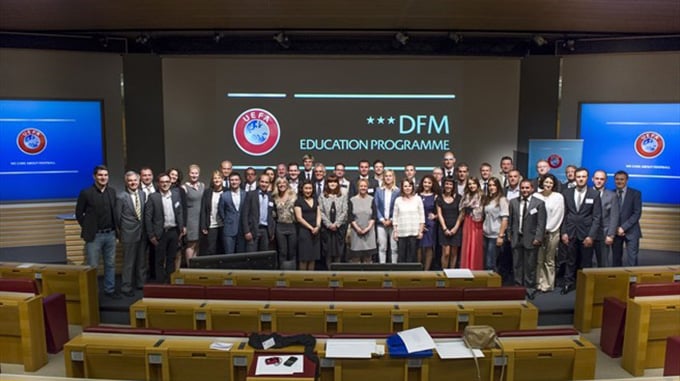Search the latest and greatest job opportunities in sport

The world of football includes a widespread range of organisational and individual processes and activities, which are simple to overlook in the excitement of a UEFA EURO match when your national team is minutes away from victory.
Taking a closer look at this match will bring to the surface a range of aspects that build the foundation of the football environment in Europe. Instead of simply seeing the match, look at the fact that the players of both teams belong to clubs as well as the national team, and that the national team is managed by the national association, which is, in turn, a member of UEFA. All these organisations have managed a number of processes and activities resulting in the organisation of the match, and the participation of your national team.
Because whether it’s a grassroots or an elite club, the national teams or associations, UEFA, governments or a host city – it’s the individuals within these bodies that can make a real difference to our sport.
As all these individuals build the basis of the European football environment, it’s key for UEFA to ensure that they are as skilled and professional as possible and that they can also constantly develop their understanding of ever changing football landscape. It’s because of this that UEFA invests in a range of different educational programmes, aiming to develop the staff and stakeholders of its 55 member associations.
So, what are these programmes? And how do they help improve the knowledge and skills of the individuals, and in turn, European football as a whole? Well, here’s a few good examples…
As the programme with the broadest reach, a good place to start is the UEFA Certificate in Football Management (UEFA CFM). This programme offers key stakeholders right across European football the chance to grow and develop their management skills and their understanding of various processes in the modern footballing landscape. We run eight UEFA CFM editions per year, alongside leading academic experts, and last year the programme reached a milestone of 500 graduates – a big moment for the team.
Because we think former players have a huge role to play in the development of the sport across the continent, we launched the UEFA Executive Master for International Players (UEFA MIP) in 2015. This programme focuses on how the former players can use their experience from the pitch to benefit the management of football off the pitch.
To provide women with the best possible base for reaching leading positions in football, the UEFA Women in Football Leadership Programme (UEFA WFLP) works to develop the soft skills needed for the individuals to navigate in the male-dominated world of football. This, to ensure that the women have the confidence and tools needed to progress within their organisation.
Focused on the more executive section of football management, but also other sports, the Executive Masters in European Sports Governance (MESGO), aims at developing the top management of the national associations through looking closer at the current challenges within the world of sports, and how to work to best approach these.
So, reflecting on why UEFA invests in education programmes, the short answer is that it is our responsibility to do so.
All UEFA’s education programmes focus on best practice sharing and creating networks across Europe, strengthening the bond between member associations and stakeholders, and making sure that successful projects and best practice examples are shared across the European football family.
So, reflecting on why UEFA invests in education programmes, the short answer is that it is our responsibility to do so. Many believe that in promoting, developing and protecting the game, UEFA solely focuses on the means of financial investments and redistribution. However, we believe that there are other crucial intangible investments to help football grow, and personal development programmes for people in charge of the administration of the game, play a key role in this.
With all the different stakeholders and activities in football, we need to ensure that the people working in this environment have access to education and personal development, in striving to have the best foundation possible for seeing football thrive across Europe, now and in the future.
This article was written by our partner UEFA.
To explore all UEFA Academy professional Educational and Training programmes click here.
Search the latest and greatest job opportunities in sport
In the world of professional sports, sponsorship represents a significant source of revenue and plays a vital role for t...
Read moreThe sports industry is a vibrant and multifaceted industry, made up of a diverse range of sectors that shape its global ...
Read morePablo Romero, director of protocol at Sevilla FC and lecturer in the UCAM Master's Degree in Sports Management, shares t...
Read more